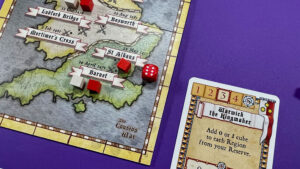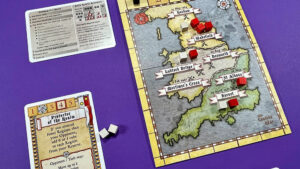 I’m still very early into my experiences with war games and campaign games but knew that I wanted to dip my toes into a game that offered a little more complexity than just “dudes on a map”. When this game claimed a short gameplay investment as well as a theme with historical ties to the 15th century in England, I decided to take the leap.
I’m still very early into my experiences with war games and campaign games but knew that I wanted to dip my toes into a game that offered a little more complexity than just “dudes on a map”. When this game claimed a short gameplay investment as well as a theme with historical ties to the 15th century in England, I decided to take the leap.
The Cousins’ War is an area influence campaign game for 2 players that takes about 30 minutes to play.
Gameplay Overview:
Since the game is based on the Wars of the Roses, there are two sides: white for York and red for Lancaster. Each side starts with one cube in each of the three regions, and after each player picks a side they take 2 of their cubes from the supply to create their reserve. Six action cards are dealt at random to each player, with the rest of the cards removed for that round.

The game takes place over a maximum of 5 rounds, with the possibility of ending earlier should certain victory conditions be met. Each round consists of 7 phases: Deal Action cards, Swap 1 Action card with an opponent, Determine Battlefield, Play Action cards, Resolve battle, Victory check, and Clean-up.
To determine the battlefield, both players simultaneously pick a battle card from their hand and reveal the chosen cards. The battle card with the earliest year is the selected battlefield for the round, which also shows how many cubes each player must add to their side.
Players then take turns playing action cards which can trigger events or provide actions like gain troops, add troops, move influence, place influence, or removing opponent’s influence. All of this is to prepare for the resolve battle phase, where players take turns being the active player in the battle sequence.

In the battle sequence, the active player will roll their three dice secretly and make a declaration about their dice roll. The declaration can be a Single X, a Double X, or a Triple X, where X is any number between 1 and 6. At this time, the opponent will then decide whether or not to believe the declaration, which has various effects on the cubes in the battlefield based on whether the declaration was true or false. The opponent will then roll their dice openly to compare against the active player’s roll, possibly resulting in cubes discarded from the battlefield. If both players remain on the battlefield, this battle sequence continues with the new active player until only one player remains on the field. After the battle sequence concludes, the winner places their cubes from the battlefield into either the corresponding region or an adjacent region on the board, or back into their own reserve. Any blue cubes (the French) are returned to the supply.
During the Victory check, if a player controls all 3 regions they are declared the winner and the game ends. If the game has reached the 5th round, the winner is the player who controls more Regions than their opponent.

Game Experience:
The game is full of balancing acts, especially with limited troops you’re unable to win battles or wars with overwhelming force consistently. Players will be trying to manage slim margins of victory during battle and in the greater region, using any oversights by an opponent as an opportunity to take over. I also enjoyed the mind puzzle of choosing command points, and events or keeping battle cards for the future. There were times when an action card had an event that would benefit me in the short term but the current round indicated that my opponent would benefit as well, resulting in my decision to deny myself the benefit. In this way, trying to avoid triggering secondary events for opponents was intriguing. I’m still not at the level of feeling comfortable with some concessions to an opponent but I’m sure in more advanced play that it could be a viable option.

In the spirit of balance, swapping the action card in Phase 2 was an interesting way to force players with a hand they were happy with into a hand that they’re just okay with. This introduces the kind of conflict realism I appreciate, where your opponent could give up something they think they don’t need but could turn things around for you or perhaps try to force your opponent to make a future choice that benefits you in some way.
You can truly feel the need to prioritize the overall war outcome and trajectory over individual battles in this game. Battles do facilitate that desired outcome as they are the most straightforward way to funnel troops onto the main region board, but with limited troops, there is give and take on how many you lock up in one region which is a satisfying brain exercise. Like other “dudes on a map” conflict games, being able to move influence from regions that were otherwise ignored is a fun way to change the momentum for regions where battles didn’t go as planned. This was my favorite method to move closer to victory as my opponent would often assume I was going to park all my troops in one spot, ignoring their potential for mobility.

Leaving it up to the die for placing or removing influence was a good design choice, as any other mechanic built in to resolve this action would have made the game longer than it needed to be. I always appreciate opportunities for luck to drive outcomes as it gets the player’s brain out of the way for a moment. Most command point actions involve troops that are in the Reserve, so having good luck during the battle sequence can slow down the opponent by locking lost troops in supply. This will force them to spend their limited action cards on command points to replenish their reserves.
While the presence of the French as temporary allies during battles was annoying, being able to come back from battles lost to them really allowed the player’s skill to shine. They do provide more opportunities to turn the tide on the battlefield during die rolls but with their limited and temporary presence, the advantage was inconsistent. It seems like their main role in battles was to provide more opportunities to send an opponent’s troops to supply, rather than to help funnel troops into regions to win the war. With the little information I was able to gather on the actual historical event, this is accurate to how the French hedged their bets on either side and were overall trying to push in whichever direction would favor them most.

I was so relieved to find that there is a victory check, as the situation can quickly change over two rounds allowing the losing player can make a comeback. A decisive win condition ahead of the maximum number of rounds means you have the opportunity to win quickly if all is in your favor and the timing is right. After our campaign ended, it was quick enough that I was tempted to ask my opponent to play until we got the best of three but decided to take my victory home with me. It’s not often that I’ll want to play the same game again right away but Cousins’ War was fast-paced and straightforward in terms of determining the winner, encouraging me to test again whether it was luck or skill (or maybe a little of both).
It is rare for a game to be perfect and my first concern with this game is about the trickiness of lengthy battle sequences where the opponent becomes the Active player. We got mixed up on who was making roll declarations and who was openly rolling. This becomes slightly more natural on a second or third play of the game, worst case a couple of rounds into your first play. My second concern is that I have yet to experience a successful bluff during the battle sequence so perhaps this is where the game experience will differ from table to table. I’d love to see the outcome of two players who like to constantly bluff so I can understand why it was incorporated into the battle sequence. What this mechanic seems to be used for is changing how long the battle could take but to me, it seems unclear whether the risk is worth the reward of a shorter battle.
Final Thoughts:
This game is for both players new to campaign games who want to test the waters and those familiar with campaign games but looking for a shorter experience. This game offers the opportunity to prove your skill in balancing resources and choosing your battles to win the war, all while spending just a half hour of your time. If you can handle a little confusion with die rolling on the battlefield and being occasionally let down by your French allies, this game is nearly perfect. However, if you’re not interested in something slightly more complex than “dudes on a map” or you’re looking for more strategy packed into this small box, this may not be for you.
Final Score: 4.5 Stars – Play as the Yorks or Lancasters in this short campaign game based on the Wars of the Roses
 Hits:
Hits:
• Intriguing balancing act on resources
• Exciting battle outcomes
• Quick gameplay means easy rematches
Misses:
• Some mechanics are slightly unclear
• Bluffing doesn’t seem worthwhile
• Alliances were often underpowered





















